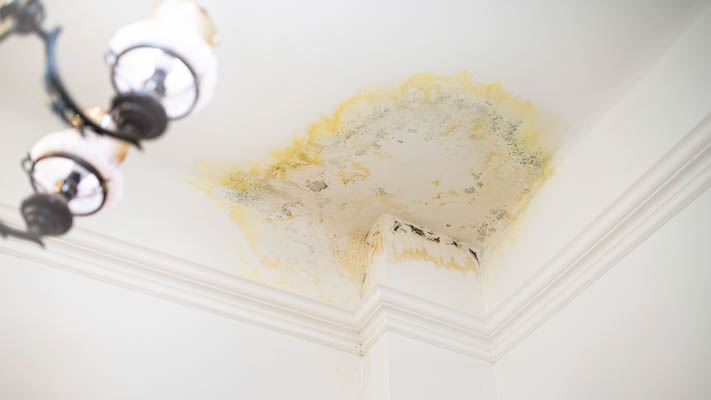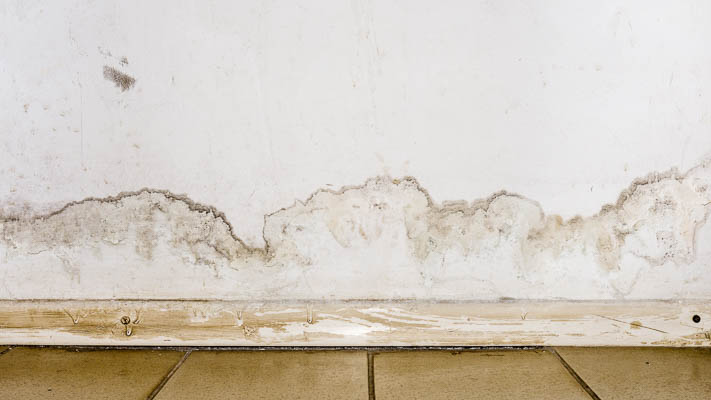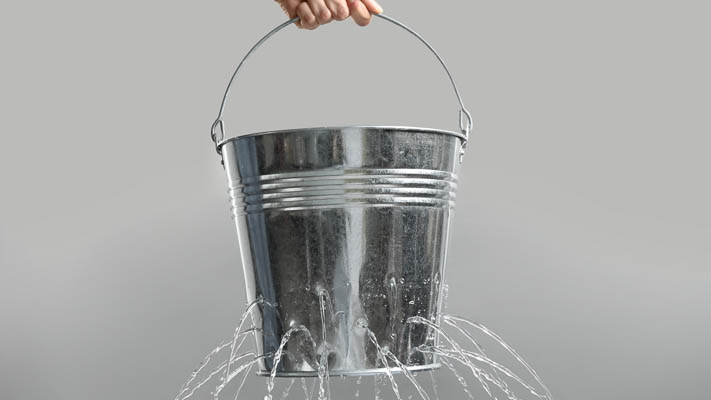What Are the First Signs of a Water Leak at Home?
The first signs of a water leak in your home may not always be obvious, especially when the leak is slow or hidden. However, there are a few key indicators that can help you spot the issue early before it causes major damage:
- Water Stains or Discolouration: One of the most common signs of a leak is the appearance of water stains or discolouration on your walls, ceilings, or floors. These stains can often appear as yellow or brown patches, and in more severe cases, they may cause the paint to bubble or peel away. Keep an eye out for these signs, especially around areas like plumbing fixtures, water pipes, or beneath windows.
- Musty or Damp Smells: Persistent damp or musty smells in your home could be a strong indicator of a hidden water leak. These odours are often caused by the growth of mould and mildew, which thrive in damp environments. If you start noticing these smells near plumbing lines or in areas where leaks are likely, it's time to investigate further.
- Increased Water Bills: An unexplained rise in your water bill may signal that water is leaking somewhere in your home. Even a slow, hidden leak can waste significant amounts of water, leading to higher charges. If your usage hasn't changed but your bills are creeping up, it could be time to check for leaks.

How Can I Check for Water Leaks in My House?
Once you've noticed the first signs of a leak, the next step is to confirm whether there's actually a problem and pinpoint its location.
A simple pressure test can help you identify slow leaks in your plumbing system. By measuring the water pressure in your home with all outlets closed, you can determine if the pressure drops over time. If you notice a significant drop, there may be a leak somewhere in your system.
You can perform this test using an inexpensive pressure gauge from a hardware store, such as US Gauge P500 2" Low Cost Pressure Gauge. Attach the gauge to a hose spigot, washing machine supply line, or water heater drain. If the pressure remains stable for 10 to 15 minutes, you likely don't have a leak. If it drops, you'll need to investigate further.
Another effective way to check for leaks is to monitor your water meter. With all water outlets in your home turned off, record the reading on your water meter. Wait 30 minutes and take another reading. If the meter shows movement, even slightly, you may have a hidden leak.
Sometimes, the best way to detect a leak is simply by visually inspecting your home. Look for signs of moisture or dampness around plumbing fixtures, under sinks, or behind appliances. Check hidden areas like inside cabinets, under rugs, and in crawl spaces for any signs of water damage. In the case of slab leaks, watch for cracks in the foundation or stains on the baseboards.
For more information, we have an article dedicated to how to detect a water leak.
What Should I Do If I Find Water Leak?
If you discover a water leak, it's essential to act quickly to prevent further damage. Here's what you should do:
- Turn Off the Water Supply: If the leak is significant, your first step should be to turn off the water supply to your home. This will stop the flow of water and prevent further damage. The shut-off valve is typically located near your water meter or where the main line enters your house. This is only a temporary fix, as leaving your water supply turned off for an extended period is not a feasible solution.
- Assess the Extent of the Damage: Once the water supply is turned off, assess the damage caused by the leak. In some cases, you may only need to fix a small, localized issue (e.g., a leaking faucet or dishwasher). However, if the leak is part of a larger plumbing issue, such as old or damaged pipes, it may require a more comprehensive solution, like repiping.
- Document the Damage: Take photos or videos of the damage caused by the leak. This documentation can be useful if you need to file an insurance claim or determine the extent of the damage when considering repairs.
- Call a Professional: If the leak is severe or you're unable to locate the source, contact a leak detection specialist. Professional technicians can help find hidden leaks and provide long-term solutions. Two leak detection companies we often recommend that have local branches in most markets across the USA include All Dry Services and American Leak Detection.
How Can I Stop a Water Leak?
The best way to stop a water leak depends on the cause and severity. For small leaks, using pipe repair tape or silicone sealant can temporarily contain the damage. These products form a waterproof seal around the leak, giving you time until professional repairs can be made.
If the leak is coming from a fixture, such as a faucet or toilet, the issue is often a worn-out part like a washer or valve. Replacing the damaged part can often fix the problem without needing to replace the entire fixture.
However, if the water leak is a result of more serious issues (such as aging or corroded galvanized plumbing, outdated polybutylene pipes, or slab leaks in the foundation), it's unlikely that a temporary fix will hold for long. In these cases, the best solution is to consider repiping your home.

Repiping involves replacing old, deteriorating pipes with new, durable materials like copper or PEX. While this may initially seem like a more expensive process, here at Repipe Specialists, we have made repiping both efficient and easy, ensuring that your entire plumbing system is up to code and free from hidden leaks.
If you're dealing with recurring leaks or signs of widespread corrosion, repiping will provide long-term peace of mind by eliminating the root cause of your plumbing issues.
Get your free estimate today
With over 75,000 repipes completed, we've perfected our One-Stop Repipe™ for your home.
Get a Quote for Repiping Your Home
Here at Repipe Specialists, we've permanently fixed leaks in thousands of homes using both copper piping and PEX tubing. We consistently receive positive customer feedback about their overall home repipe experiences and often exceed their expectations in the following areas:
- Speed: Our repipe crews typically complete a repipe in a day, returning on another day for wall patching.
- Convenience: Through our One-Stop Repipe™ Process, we handle everything from permits, to wall patching, to inspections.
- Cleanliness: Our crews are trained to protect your home while working (we cover all surfaces with protective sheeting), and to clean up fully at the end of each day.
- Peace of Mind: Repipe Specialists is a fully licensed plumber in every state we operate in, and we back all of our repipes with a lifetime warranty.
- Financing programs: To help take the sting out of unplanned repipe expenses, we offer several financing programs.
- Price: As a specialist that performs hundreds of repipes a week, we can deliver high quality repipes at a lower cost vs generalist plumbers. Our quotes typically range from $4,500 to $15,000 depending on the size and complexity of your project. We have an article that covers repipe cost factors in detail.
Schedule a free in-home consult, and one of our local repipe consultants will explain all your repipe options and provide you with a written, fixed-price quote.

